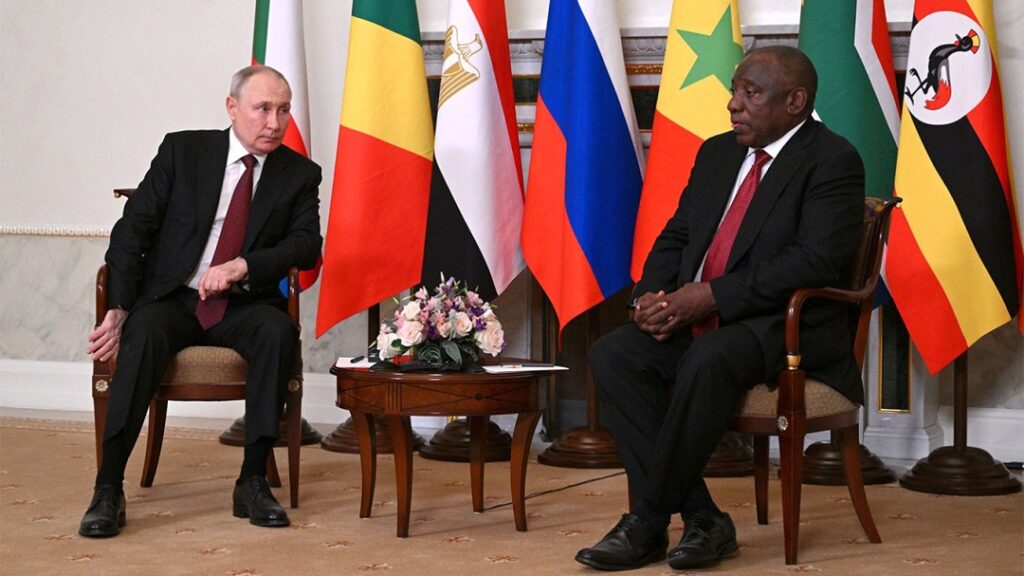- South Africa is desperately reaching out to Putin, persuading him to stay away from BRICS Summit in August.
- “It’s a big dilemma for us. Of course, we cannot arrest him”—South Africa Deputy President Paul Mashatile.
- US is accusing South Africa of providing Moscow with military hardware for the Ukraine war.
Authorities in Pretoria are stuck in a political quandary as South Africa weighs security risks emanating from Russian President Vladimir Putin’s plans to attend BRICS summit in Johannesburg next month.
South Africa’s reluctance to arrest Putin is increasingly casting a shadow on the August summit in South Africa.
Media reports say South Africa is desperately reaching out to Putin persuading Putin to stay away. This as the country seeks to avoid triggering legal and diplomatic fallout over his international warrant of arrest, South Africa’s deputy president was quoted last week.
“It’s a big dilemma for us. Of course, we cannot arrest him,” South Africa Deputy President Paul Mashatile said in an interview with News24.
“It’s almost like you invite your friend to your house, and then arrest them. That’s why for us, his not coming is the best solution. The Russians are not happy, though. They want him to come.”
BRICS leaders’ summit in Jo’burg
According to South Africa, all of the BRICS leaders, including Chinese President Xi Jinping, were invited to the summit before Putin was charged.
The host nation runs the risk of further deteriorating its ties with the West by allowing Putin to freely attend the BRICS summit of Brazil, Russia, India, China, and South Africa.
Currently, the relationship between the US and South Africa is strained. The US is accusing South Africa of providing Moscow with military hardware for the Ukraine War via a Russian cargo ship that stopped at South Africa’s main naval facility near Cape Town in December.
Due to South Africa’s status as a signatory to the treaty that established the International Criminal Court, the country is under the obligation to apprehend Putin based on the court’s indictment issued in March. The indictment accuses the Russian leader of war crimes related to the abduction of children from Ukraine.
South Africa’s diplomatic dilemma
Cyril Ramaphosa, the president of South Africa, assigned his deputy Mashatile the task of coming up with a solution to the diplomatic dilemma.
According to Mashatile, Russia has rejected the alternatives, which included hosting a virtual summit, shifting the event to China, or having Foreign Minister Sergey Lavrov represent Russia.
Moscow is already disregaring the warrant issued against Putin. And it is probable that South African will violate the treaty by choosing not to arrest him.
However, certain opposition parties, rights groups, and legal activists argue that he should be apprehended. They are also threatening to take matters into their own hands, raising security concerns for the BRICS summit.
At the Russia-Africa summit in St. Petersburg at the end of the month, Ramaphosa will now make an effort to persuade Putin not to visit South Africa.
South Africa: We’re part of the Rome Statute
“We’ve now decided to leave this matter with the president, who is talking to Putin,” Mashatile noted. “The president is going to the Russia-Africa summit later this month, so they will continue to talk. We want to show him the challenges that we face because we are part of the Rome Statute and we can’t wiggle out of this.”
Since ICC’s arrest warrant against Putin, he has not visited any country that is a signatory to the court treaty. The Kremlin has not confirmed Putin’s attendance at any upcoming events. What’s more, recent uprising by the Wagner group in Russia seems to have whittled down the likelihood of his travel due to the serious threat it posed to his leadership.
This is not the first time South Africa is finding itself in such a diplomatic bind. In 2015, authorities failed to arrest former Sudan strongman Omar al-Bashir, who made a visit to the country while under ICC arrest warrant for alleged war crimes, crimes against humanity and genocide.
Russia-Africa Summit
Beginning on Sunday, July 24, Sergey Lavrov, will travel to Ethiopia, Egypt, Uganda, and Congo-Brazzaville. The visit occurs before the second Russia-Africa summit set for October or early November in Ethiopia.
Several African Heads of State and government attended the inaugural Russia-Africa Summit in Sochi, Russia in 2019.
On May 29, Russian Foreign Minister Sergey Lavrov unexpectedly paid a visit to Nairobi and spoke with Kenyan officials. Lavrov’s visit occurred as Moscow and Kiev both aim at winning African nations’ backing for the conflict in Ukraine.
“During our visit, we will discuss our cooperation in the trade, investment and economic spheres, humanitarian and cultural questions, education, cooperation in the UN and many other issues,” Lavrov told lawmakers in Nairobi.

